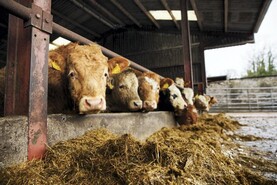The emissions associated with 500,000 cattle in Dawn Meats’ supply chain are monitored at any one time as part of the processor’s plan to cut its 40,000 farmer suppliers’ emissions over the coming years, the processor has reported.
Dawn Meats stated that it is targeting a 28% reduction in the emissions per tonne of processed beef to help the company’s plan to reach net zero by 2050.
The processor is developing a system of calculating bespoke carbon footprint emissions from birth to factory gate.
There has been a 15% reduction in the emissions intensity of the beef and lamb processed by Dawn between 2016 and 2022, according to a recent update from the processor on its sustainability plans.
Some 96% of the processor’s cattle and 80% of its sheep are currently sourced from Bord Bia quality assured farms.
The corresponding supply figures for the UK’s Red Tractor programme come in at 99% for cattle and 97% for sheep.
€100m pledged
Dawn Meats chief executive Niall Browne maintains that sustainability has been “central” to the business’s activities over the past 40 years and that significant funds are committed to its net zero plan.
“We also recognise that achieving our targets requires real action, which is why we have committed €100m by 2030 as part of our Plan Four Zero initiative,” Browne said.
“Getting to net zero involves big changes within our business and transformation across our supply chain.”
Halving processing emissions
The processor’s sustainability director Gill Higgins insists that the company is serious about meeting its environmental targets.
Dawn Meats reported that it only uses renewable electricity to power its plants, to have saved over 800t of plastic packaging in the past two years and to have almost halved processing emissions.
“This update report outlines the wide range and high number of projects we have invested in and the system changes we have introduced,” Higgins stated.
“These science-based measures have allowed us to achieve a series of important and carefully measured savings on emissions, energy, water usage, packaging and waste.
“In addition, we are committed to working with the rest of the industry to address wider sustainability challenges and to remain competitive in the marketplace.”






 This is a subscriber-only article
This is a subscriber-only article










SHARING OPTIONS: